The alley, just off Franklin Arterial in the heart of the Portland peninsula, has an informal name. But it’s too vulgar to repeat here.
“There’s a little doo-doo over there and a little over here and I got to admit, it’s mine,” cautioned an apologetic Jess, the alley’s lone occupant, as Joe McNally and Kirk Carlsen stepped gingerly over the mud, the soggy mattress, the broken glass and other detritus.
It was early on a brilliantly sunny Tuesday afternoon. Jess was deep into a bottle of Schlitz Bull Ice, an 8.2-percent-alcohol that fogs the brain twice as fast as normal beer. But at least it wasn’t whiskey.
“I’m trying to keep away from the whiskey the best I can,” said Jess.
“All right,” replied McNally. “I hope so.”
“I think it’s been a couple of weeks since I even had one of those shot bottles,” Jess promised.
McNally nodded. “That sounds about right. I don’t know if it’s completely accurate, but it sounds about right. OK, Jess. We’ll swing back down in a bit.”
Jess would likely be dead by now if not for the HOME Team, perhaps the least-known, most-valuable strand in the social safety net of Maine’s largest city.
Directed by McNally since its inception in 2010, the Homeless Outreach & Mobile Engagement program is an outgrowth of the Milestone Foundation on India Street, home to an emergency shelter, detoxification unit and housing program for adults with alcoholism and other addictions.
It’s also, as usual, on financial life support. Unless the Portland City Council follows City Manager Jon Jennings’ recommendation in the coming weeks and steers a relatively meager $73,000 toward the HOME Team in the next fiscal year, life on the streets of downtown Portland – for everyone – soon could get noticeably uglier.
“It is one of the most vital programs that we have in our city,” Jennings said last week. “However long I’m here, I’m going to make sure that we work with them.”
Monday through Saturday, from noon until 8 p.m., the HOME Team’s Ford Transit van meanders virtually unnoticed throughout the Portland peninsula.
With McNally usually at the wheel and an assistant riding shotgun with logbook in hand, the mission is as simple as it is unsavory: Keep a finger on the pulse of Portland’s most downtrodden, a remarkably tight-knit community of mostly adult men with an array of alcoholism, addiction and mental health problems. And when the situation warrants, which it often does, get them off the streets before trouble erupts.
From a practical standpoint, the program is worth its weight in gold. Take, for example, the “police call” that came in to the HOME Team midway through Tuesday’s shift: a man lying unconscious on the sidewalk at Cumberland Avenue and Alder Street.
Upon arrival, McNally and Carlsen saw no flashing lights, no police cruiser, no Medcu unit, no commotion whatsoever. Just a middle-aged man named Hada – McNally and Carlsen knew him well – passed out with two unopened cans of Anheuser-Busch Natty Daddy by his side.
“He’s probably had two, planning on four,” said McNally once they’d safely loaded Hada aboard the van. Securing the two 16-ounce cans of high-octane, foul-smelling brew in a plastic bag, he added, “They should arrest the makers of this stuff the same way they do the drug dealers.”
So, with no police in sight, how was this a “police call”?
“They called us,” McNally replied.
There was a time when a police cruiser would have carted Hada off to the Cumberland County Jail or Medcu would have transported him to a local emergency room – both at a relatively enormous cost to local taxpayers – so he could essentially sleep this one off.
No longer. On this day, the HOME Team quietly transported him to the Milestone Foundation, where he was first led to a shower, then given clean johnnies while his street clothes were washed and dried, then provided a hot meal and finally given one of 43 mattresses for a safe and warm night’s sleep.
With a little luck, Hada might eventually find his way upstairs into Milestone’s 16-bed detox unit. More likely, he’d be back on the street the next morning repeating this cycle all over again.
Either way, the HOME Team would be there.
McNally is well aware that from the outside, some might view him and his fellow team members as enablers. The Milestone Foundation, unlike other social service agencies in Portland, admits all comers regardless of their sobriety level.
But in a world where treatment options are few and life-and-death risks are many, McNally said, the primary goal is simply to keep many of these people alive from one day to the next. From there, he and the rest of the Milestone staff can began to build the trust so critical to actually putting broken lives back together.
“The folks here, we’re not making a great wage,” McNally said. “We’re not here because it’s a great paycheck and all that stuff. We’re not here for all the fame and autographs either. We’re here because we’re doing what no one else can, better than anyone else could. We’re providing hospice care to guys who don’t get care anywhere else. Some of our guys won’t access ERs, they won’t eat at Preble Street (a local soup kitchen), so we’re all that they have.
“So when people say, ‘You let them drink in an alley.’ Yes, we did. Because if not, his schizophrenia is going to be out of control and he’s going to be pacing in front of your apartment swearing his head off. So trust us. Allow us to do our job.”
According to the draft of a recent study by professor Thomas Chalmers McLaughlin of the University of New England’s Social Work Center for Research and Evaluation, the HOME Team averages 34 “encounters” per day with people on the street – putting it on pace, according to McNally, to exceed 10,000 encounters for the fiscal year that ends on June 30.
Many are as simple as the five-minute check-in with a man on a bench near the Hannaford supermarket at Back Cove – a nurse from Mercy Hospital had recognized him as a client and called in to make sure he was all right.
“You OK, Michael?” asked McNally, climbing out of the van.
“Yeah,” replied Michael. “Just waiting for my buddy to get done with the doctor. Then he’s going to bring me to my doctor’s appointment. My sciatica’s killing me.”
Enough said.
An hour later, McNally pulled up to the curb on Preble Street to check on Scott, who not too long ago sustained severe third-degree burns to his lower leg when he passed out on vodka by a campfire “out near the Portland-Westbrook line” and his sneaker melted through to the skin.
A lifetime ago, Scott played bass in a well-known punk rock band. Now, he drinks on the street.
“From rock star to street star,” mused Scott, who in a few hours would show up, far less lucid, at Milestone’s India Street shelter.
“You’re still a superstar in my book,” replied McNally with a smile.
It was music to Scott’s ears.
“I can’t put it into words,” he said. “I love these guys. I love every one of them. I don’t know where I’d be without them. They take good care of us. They treat us like family.”
It’s mutual. A short distance away on Oxford Street, Larry and Barbara – McNally calls her “Babs” – were sharing an afternoon brew when the HOME Team pulled up for a visit.
A couple of years back, Milestone helped Barbara find housing. But she’s long had trouble getting heat and now the hot water is off and she’s not sure how long she’ll be staying put.
But this visit wasn’t all about Barbara. She recently heard that McNally’s mother passed away in January.
“I’m sorry about your mother, Joe,” she said, touching his arm tenderly.
“Thank you,” replied McNally. “That’s very sweet of you. First of the year, she passed. I appreciate that.”
“But she’s watching over you.”
“Yes she is.”
“She’s your guardian angel.”
“Without a doubt.”
“I love you.”
“I love you too, Babs.”
The compassion that permeates the HOME Team was not lost on City Manager Jennings several years ago when, as president and co-owner of the Portland Red Claws basketball team, he co-chaired a task force on homelessness in Portland. It was then that he first became aware of how much the program contributes to the quality of life in Portland.
“What they do is integral to the fabric of what this community is all about,” said Jennings. “We are a caring and giving community and unfortunately police and fire, just the sheer capacity of what we have to deal with on a daily basis, can’t possibly deal with everything.”
Now, as he prepares his first municipal budget, Jennings is also well aware that the HOME Team saves the city some $60,000 a year in emergency response costs alone.
Add to that another $145,000 in shelter beds and other services provided by Milestone and it becomes clear why Jennings recently overruled a recommendation by the city’s Community Development Block Grant Allocation Committee that the HOME Team receive no funding. Under the committee’s scoring system, it missed the cut by less than a point.
Rather, Jennings proposed that the HOME Team receive just over $54,000 from the city’s $1.79 million in federal community development funds. He then found other municipal money to bring its total allocation to $73,000, roughly half of the HOME Team’s annual operating budget.
It would be easy, since Jennings took the city’s top administrative job last June, to forget all about the HOME Team. Instead, much to his credit, he’s become one of its biggest cheerleaders.
“In many ways I feel a unique responsibility to make sure that those most vulnerable citizens are protected and they’re receiving the kind of service that they so desperately need,” he said.
Citizens like Jess, who last Tuesday, before McNally and Carlsen returned to the alley to pick him up, miraculously made it under his own steam to India Street and checked into the Milestone shelter on his own.
Two years ago, in that same alley, Jess was attacked and left for dead.
“They hit him with a rock in the front of his face, crushed his orbital socket,” said McNally. “Then he fell backward and fractured his skull in back. He was in a coma for close to 40 days – they were not sure he’d live.”
His discharge plan from the hospital read, “To shelter.”
“Back before the attack, his functioning was up here,” said McNally, raising his hand above his head. Lowering it below his knees, he added, “Now, he’s down here.”
Yet there Jess now stood, freshly showered, dressed in his red johnnies for the night, his wool hat perched atop his wet hair, happy as a clam.
Over the next few hours, the HOME Team would bring in dozens more like him, some in need of an arm, some able to go it alone, some coherent, some not so much, some with a ray of hope, some hanging by a thread.
But every last one of them grateful. Once again, against all odds, they’d found their way home.
Send questions/comments to the editors.


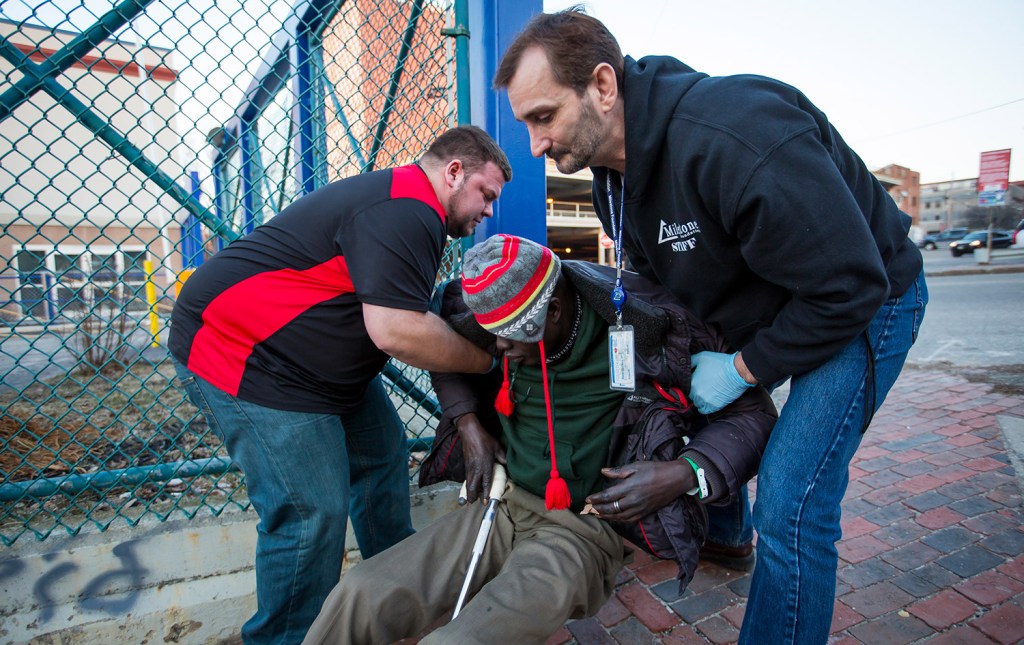
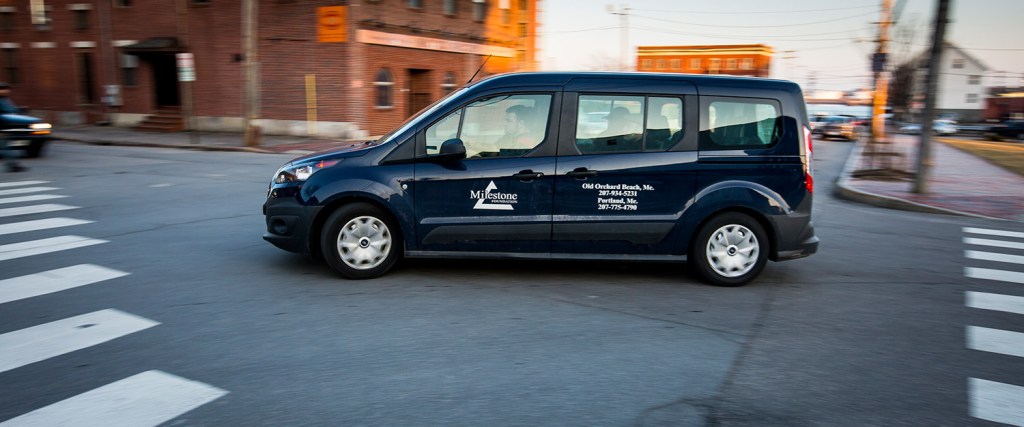
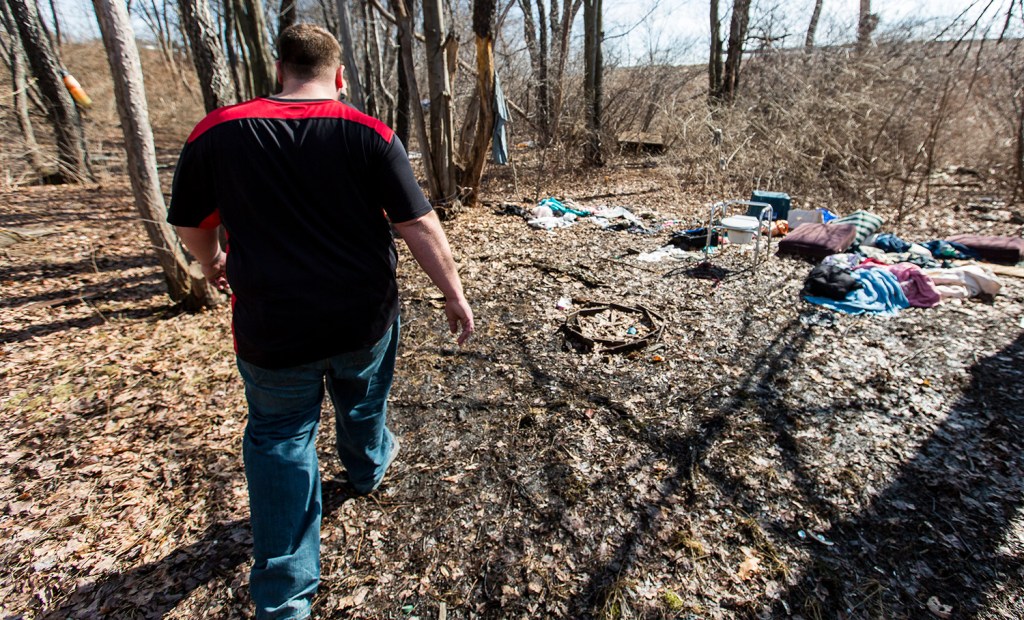
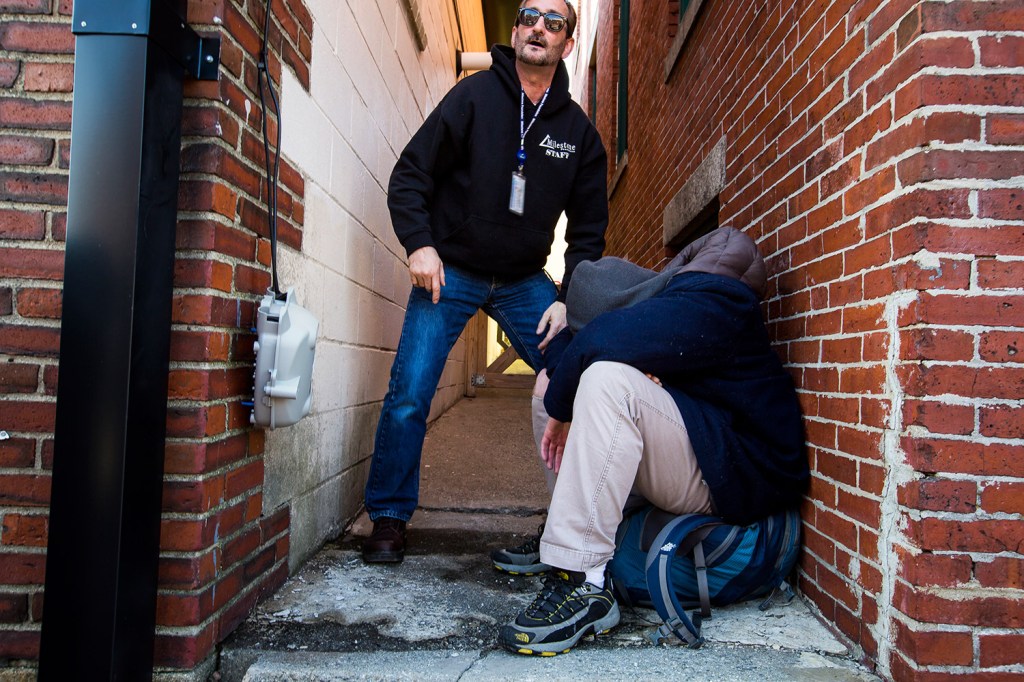
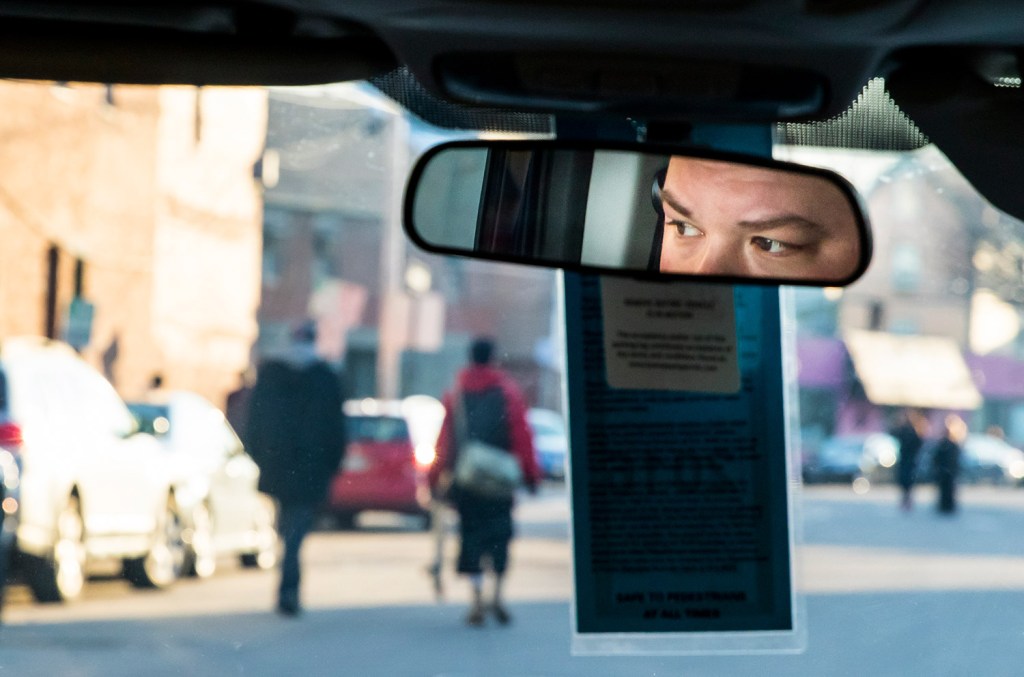
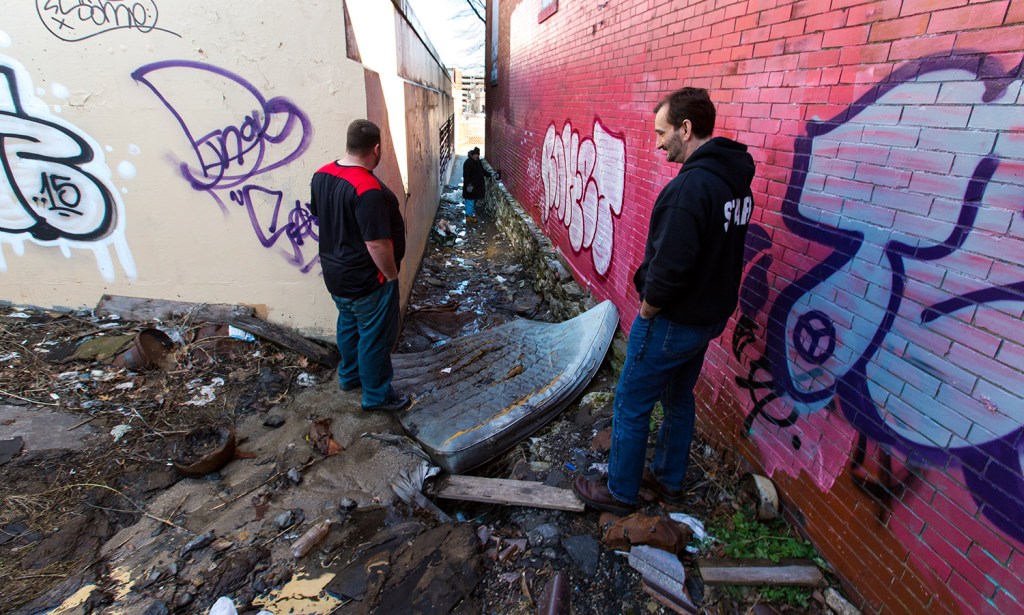
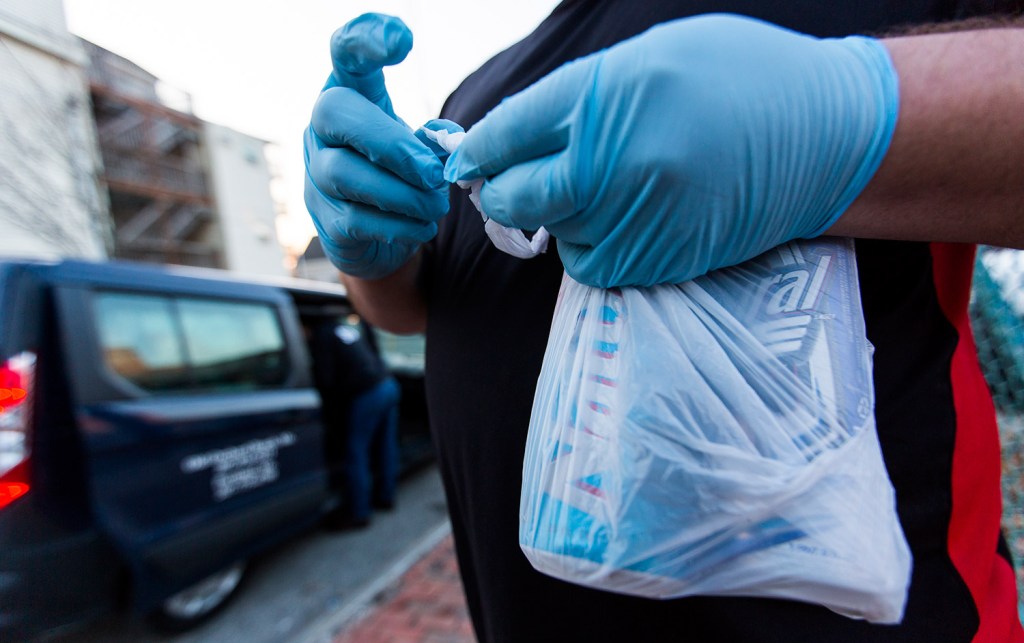
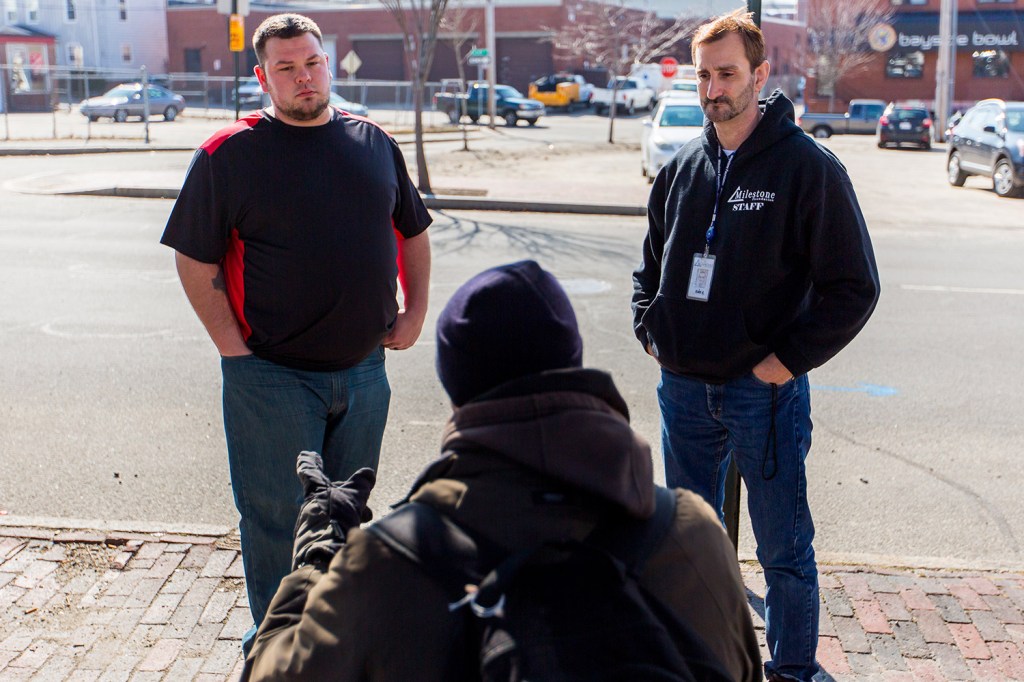

Success. Please wait for the page to reload. If the page does not reload within 5 seconds, please refresh the page.
Enter your email and password to access comments.
Hi, to comment on stories you must . This profile is in addition to your subscription and website login.
Already have a commenting profile? .
Invalid username/password.
Please check your email to confirm and complete your registration.
Only subscribers are eligible to post comments. Please subscribe or login first for digital access. Here’s why.
Use the form below to reset your password. When you've submitted your account email, we will send an email with a reset code.